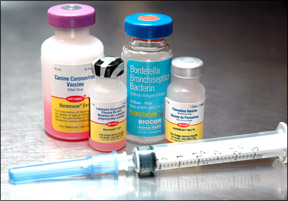Annual Vaccinations for Your Dog?
Are they really necessary? - In a word, NO!
You probably receive an annual reminder from your vet that your dog is due for his/her annual checkup and vaccinations. I do.
But I don't have my dogs vaccinated any more.
For years I was hoodwinked into believing that vaccinations were essential to my dogs' health. Why else would my vet tell me my dogs needed an annual booster vaccination shot?
Why indeed.
I learned the answer when, after careful research, I decided not to expose my dogs to what I believe is unnecessary, and potentially dangerous, toxins, any more.
I received the letter from my vet as usual, advising that my dogs' annual checkup and vaccinations were due.
I made an appointment and arrived ready to do battle. I advised the vet that I had decided not to have my dogs vaccinated any more. She said "Fine."
That's right - after years of leading me to believe that these vaccinations were essential to my dogs' wellbeing, the vet agreed that they were not in fact necessary at all! She went on to stress the importance of still bringing the dogs in for their annual physical checkup (which was what I was doing, and certainly intended to continue to do).
So that's why we're all told that our dogs need annual vaccinations - it's simply a ploy to get us in so our dogs can be given a physical. Why not just tell us how important these annual checkups are instead of slowly but surely poisoning our dogs with these vaccines?
I don't have the answer to that, but I can tell you I was speechless.
I've now found out that all across America a new protocol for vaccinating dogs has now been issued and is slowly making its way to vets. (I haven't been able to locate a similar protocol for Australia, but I'm sure it's in the pipeline). This protocol does not recommend any vaccinations for dogs beyond 1 year of age!
Make sure you ask your vet next time a vaccination has been recommended for your dog - it this really necessary? And if you're not satisfied with the answer, consider getting a second opinion from another vet.
Side effects of this appalling over-vaccination which has been going on for years can be significant and severe.
You can clear your dog's system from all toxins by Removing Toxins Naturally - Click Here: http://www.HealthyHappyDogs.com/RemoveToxinsNaturally
(c) 2005, Brigitte Smith
Are they really necessary? - In a word, NO!
You probably receive an annual reminder from your vet that your dog is due for his/her annual checkup and vaccinations. I do.
But I don't have my dogs vaccinated any more.
For years I was hoodwinked into believing that vaccinations were essential to my dogs' health. Why else would my vet tell me my dogs needed an annual booster vaccination shot?
Why indeed.
I learned the answer when, after careful research, I decided not to expose my dogs to what I believe is unnecessary, and potentially dangerous, toxins, any more.
I received the letter from my vet as usual, advising that my dogs' annual checkup and vaccinations were due.
I made an appointment and arrived ready to do battle. I advised the vet that I had decided not to have my dogs vaccinated any more. She said "Fine."
That's right - after years of leading me to believe that these vaccinations were essential to my dogs' wellbeing, the vet agreed that they were not in fact necessary at all! She went on to stress the importance of still bringing the dogs in for their annual physical checkup (which was what I was doing, and certainly intended to continue to do).
So that's why we're all told that our dogs need annual vaccinations - it's simply a ploy to get us in so our dogs can be given a physical. Why not just tell us how important these annual checkups are instead of slowly but surely poisoning our dogs with these vaccines?
I don't have the answer to that, but I can tell you I was speechless.
I've now found out that all across America a new protocol for vaccinating dogs has now been issued and is slowly making its way to vets. (I haven't been able to locate a similar protocol for Australia, but I'm sure it's in the pipeline). This protocol does not recommend any vaccinations for dogs beyond 1 year of age!
Make sure you ask your vet next time a vaccination has been recommended for your dog - it this really necessary? And if you're not satisfied with the answer, consider getting a second opinion from another vet.
Side effects of this appalling over-vaccination which has been going on for years can be significant and severe.
You can clear your dog's system from all toxins by Removing Toxins Naturally - Click Here: http://www.HealthyHappyDogs.com/RemoveToxinsNaturally
(c) 2005, Brigitte Smith
Brigitte Smith is a dog lover with a special interest in holistic dog health. Her site, Healthy Happy Dogs, has pages and pages of information on improving your dog's health naturally. Brigitte is the author of a number of reports, articles, and the Healthy Happy Dogs newsletter.
For your special FREE report - "How to Improve Your Dog's Health Within 30 Days - Maybe Even Lengthen Your Dog's Life!", Click Here for Your Free Dog Health Report! - http://www.HealthyHappyDogs.com
For your special FREE report - "How to Improve Your Dog's Health Within 30 Days - Maybe Even Lengthen Your Dog's Life!", Click Here for Your Free Dog Health Report! - http://www.HealthyHappyDogs.com
Article Source: http://EzineArticles.com/?expert=Brigitte_Smith










